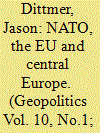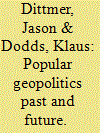| Srl | Item |
| 1 |
ID:
184336


|
|
|
|
|
| Summary/Abstract |
In this paper we argue that superhero cinema offers an opportunity to think through the narratives and affects of the refugee crisis, which are distinct from, but related to, the relatively well-attended-to tropes of journalism. To do so we adopt both the ethical stance of feminist political geography and the analytic methods of popular geopolitics. Our analysis focuses on two films from the burgeoning Marvel Cinematic Universe (MCU): Thor: Ragnarok and Captain Marvel. Both films are not ‘refugee films’ per se, but they illustrate the ways in which the ongoing ‘refugee crisis’ is being dealt with in mainstream, corporate Hollywood blockbusters. The two films are considered both in their narrative and affective engineering, as part of an effort to understand the ways in which political subjects might be shaped by the act of viewing. Our analysis uncovers three themes: 1) mobility as power, 2) the aesthetic of modernity, and 3) refugee bodies. We conclude that studies like this can contribute to a broader understanding of the role of whiteness and securitisation in the portrayal of refugees in the Global North.
|
|
|
|
|
|
|
|
|
|
|
|
|
|
|
|
| 2 |
ID:
191653


|
|
|
|
|
| Summary/Abstract |
This introduction to the special section focuses on the geopolitical relevance of tourism in the Indo-Pacific region. We first review the literature on everyday geopolitics, or Popular Geopolitics 2.0, elaborating the trend of attention to tourism activities in political geography. We then turn to tourism studies and find the divergence and convergence between these literatures. Finally, we argue that a focus on the Indo-Pacific offers new points of purchase for critical scholars reassessing the geopolitics of tourism. This introduction sets a scene for the other articles in this special section, calling for a re-thinking of the links between tourism and geopolitics from a more inclusive perspective that goes beyond Euro(American)centrism.
|
|
|
|
|
|
|
|
|
|
|
|
|
|
|
|
| 3 |
ID:
123698


|
|
|
|
|
| Publication |
2013.
|
| Summary/Abstract |
Model United Nations (MUN) is a simulation in which students take on the roles of ambassadors to the United Nations, engaging in debate on 'real' issues from the perspective of their assumed national identities. This paper, based on a year of ethnography and interviews of a college-level MUN team, examines the role of humour in producing particular geopolitical imaginations among those participating and also in producing the MUN assemblage itself. Key here is the circulation of affects among participants' bodies, producing an orientation among them that facilitates debate and consensus-building. This finding is seen as a corrective to past work on geopolitics and humour, which has tended to emphasise irony and satire, as well as mass-mediated humor.
|
|
|
|
|
|
|
|
|
|
|
|
|
|
|
|
| 4 |
ID:
060801


|
|
|
|
|
| Publication |
2005.
|
| Summary/Abstract |
This essay investigates the contemporary evolution of the symbolic shape of Central Europe by conducting a quantitative and qualitative content analysis of newspaper articles from the Lexis–Nexis database covering NATO and EU expansion. The results of this content analysis show that Central Europe is associated with different symbolic shapes at different times and in different political contexts, and therefore the idea of one hegemonic Central Europe, either transcending time and context or tied to an institutional identity, is a fallacy. ‘Central Europe’ has shaped NATO and EU expansions, but similarly those processes have constructed differing geopolitical images of Central Europe that are mediated to the consumers of the newspapers. In contrast to these differing symbolic shapes, a series of common structures of expectation were associated with Central Europe that constructed the region as different from Eastern Europe
|
|
|
|
|
|
|
|
|
|
|
|
|
|
|
|
| 5 |
ID:
084634


|
|
|